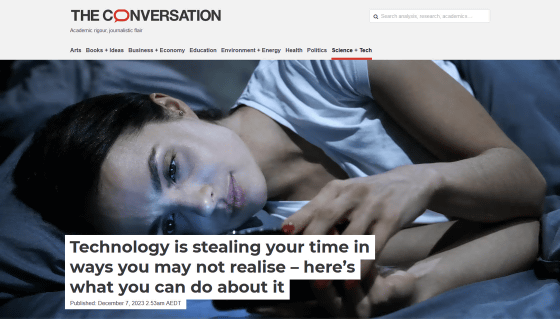Modern people are robbed of their time by technology, so how can they regain their leisure time?

Technology was created to make people's lives easier, but even though we can now use smartphones, PCs, and the Internet, many people still have little time to relax.
Technology is stealing your time in ways you may not realise – here's what you can do about it
https://theconversation.com/technology-is-stealing-your-time-in-ways-you-may-not-realise-heres-what-you-can-do-about-it-216863

Commenting on the phenomenon of free time decreasing despite advances in technology, Ogden et al. There is increasing evidence that this is the case.'
Mr. Ogden and his colleagues interviewed 300 people living in Europe and investigated how they use digital devices in their daily lives. As a result, it seems that people cram some tasks into their free time to avoid creating ``blank time'' in their lives, and it seems that it was found that some tasks cannot be performed without technology.
For example, in the past, time spent simply waiting for the bus, free time right after waking up in the morning, and time spent lying in bed at night are now spent doing brain training, playing game apps, checking social media, and watching videos. Most of the time is spent watching videos, creating to-do lists, etc. As a result, we no longer have the ``time to do nothing'' that people imagine.

One of the reasons why digital tasks have increased in modern society is that modern people want to get closer to the 'perfect life' they see on the Internet. Originally, people felt satisfied with activities such as ``eating dinner,'' ``watching TV,'' and ``exercising,'' but today people are no longer satisfied with these activities and are trying to avoid wasting time. I tend to pack in tasks.
Technology has made it possible to accomplish various tasks in a short amount of time. For example, online banking allows you to send money and transfer money without having to go to the bank during your lunch break at work, which should theoretically free up more time, but it's still too crowded with all those small digital tasks and time-killers. As a result, people today live more densely than ever before.
In addition, many people probably check social media and video streaming sites in their free time, but research by Ogden et al. shows that people often feel guilty or regret when they spend their free time engaging in online activities. It seems that this has been found out. This suggests that people still find value in real-life activities more than online ones.
Changes in work due to the development of technology are also one of the reasons why modern people have less leisure time. For example, with the spread of email and video conferencing, many people are now working from home, and as a result, the line between work and private life has become blurred. As a result of changing the work place from the office to the home, it becomes possible to work in a way such as ``I put the kids to bed before I go to work,'' and there is a risk that time for relaxing will be taken away.
Before email and video conferencing became popular, it was common for people to talk face-to-face or wait for a reply to a letter. However, in modern times, it has become possible to exchange work anywhere with a PC or smartphone, and there are demands for constant responses. Ogden and his colleagues also pointed out that there is a pattern in which the introduction of poorly designed technology actually increases effort. As a result of this increased work effort, pressure increases, stress and fatigue worsen, and there is a risk of burnout syndrome.

Ogden and his colleagues believe that in order for modern people to regain the time lost to technology, they may need to fundamentally change the way they allocate their time. The most important thing to break free of the habit of cramming more and more tasks into your free time is to accept that it's okay to have time to do nothing.
It is also important for employers to create a work environment where it is normal for employees not to be able to contact each other, rather than requiring them to be ``always available for contact via smartphone or PC.'' In recent years, a movement has been promoted in European countries such as France and Italy to recognize the ``right to disconnect,'' which allows employees to refuse contact from the workplace outside of working hours.
The ``right not to be connected'', which allows people to turn off their digital devices outside of working hours and refuse work communications, is being promoted in Europe - GIGAZINE

It's also possible that the very technology that stole people's time holds the key to getting it back. If your smartwatch doesn't tell you to get up and move around because you've been sitting for a long time and fills you with new tasks, it will tell you to take a break because your work hours are over, so let's stop working. Mr. Ogden and his colleagues argued that if this happens, people's lives could change significantly.
Related Posts:
in Note, Posted by log1h_ik







